|
New IRmep book now available!

on Twitter!
Audio


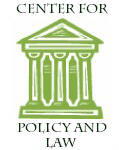

|
 12/18/2007
AIPAC Espionage Trial 12/18/2007
AIPAC Espionage Trial |
|
Case Thrown
Out before Trial? |
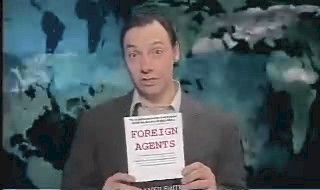 Leonard Charles, Inn
World Report: Before we have to go, let's talk for a moment about the
Steve Rosen- Keith Weissman case which comes back into court in April. This
is, to most people who have seen it, a blatant case of AIPAC's involvement
in stealing US secrets. The Espionage Act comes into play. How is this
developing, and once again, will those closely associated with AIPAC be let
off the hook? Leonard Charles, Inn
World Report: Before we have to go, let's talk for a moment about the
Steve Rosen- Keith Weissman case which comes back into court in April. This
is, to most people who have seen it, a blatant case of AIPAC's involvement
in stealing US secrets. The Espionage Act comes into play. How is this
developing, and once again, will those closely associated with AIPAC be let
off the hook?Grant Smith: Well,
this is a very high stakes trial, and basically, what we are talking about
is that if Rosen and Weissman, along with their Department of Defense, and
press, and collaborators gone forward, we might very well have American sons
and daughters fighting a ground war in Iran. This is all about Iran.
But when you look at the
maneuvers in the court, we've seen almost two years of very savvy legal
maneuvering trying to get this thrown out of court on numerous pretexts.
And what we see is that the press is very much in favor of seeing this go
away. The Wall Street Journal had a major editorial about how new attorney
general Mukasey's first job should be throwing this out of court. We've
seen the Washington Post and others saying that this is about free speech
and that these lobbyists are the equivalent of reporters who should not be
denied access to information, or any (classified) information they can find,
and the judge himself has set extremely high standards. Although the act
that they are being prosecuted under states that they should be shown to
have either advantaged a foreign country or harmed US interests, he is
insisting that it be shown that these actions taken by Rosen and Weissman
actually harmed the United States. So it is extremely...if
the case follows any
historic pattern, we will not see this ever get to court. Certainly not
April 29. The Bush administration has too much to lose, the
mainstream press has too much to lose, Congress has too much to lose, and,
of course, AIPAC.
|
|
Audio File (MP3)
Windows Audio (WMA) Windows
Media Video (WMV)
Transcript (HTML) |
 |
 12/28/2007
Spotlight on International Nonprofit Money
Laundering 12/28/2007
Spotlight on International Nonprofit Money
Laundering |
|
Interpol to Get Involved in
2008? |
 Ronald
Noble, the Secretary-General of Interpol, has
a difficult decision to make in 2008. On August 14, 2005 USA Today
and other news organizations broke the news that Israeli prosecutor
Talia Sasson had uncovered a massive international money laundering
network, though it received little
Congressional or law enforcement attention in
the United States. Sasson detailed how
nonprofit charitable funds were used to illegally confiscate and develop
Palestinian lands across the Israeli occupied
West Bank in direct contravention of Israeli, US and international law. Ronald
Noble, the Secretary-General of Interpol, has
a difficult decision to make in 2008. On August 14, 2005 USA Today
and other news organizations broke the news that Israeli prosecutor
Talia Sasson had uncovered a massive international money laundering
network, though it received little
Congressional or law enforcement attention in
the United States. Sasson detailed how
nonprofit charitable funds were used to illegally confiscate and develop
Palestinian lands across the Israeli occupied
West Bank in direct contravention of Israeli, US and international law.
On March 18, 2005, the Jewish Daily Forward
had already revealed that as members of
governing bodies of the World Zionist Organization, US divisions of
Hadassah, B'nai B'rith and other tax exempt organizations were directly
linked to this criminal activity. Unfettered US nonprofit money
laundering continues to finance a major source of grief and violence
that generates international terrorism.
US law enforcement agencies are hobbled
by outside domestic lobbies and internally by political appointees
determined to proactively take major law enforcement issues involving
Israel "off the table." Fortunately, Interpol remains well situated to
pursue law enforcement solutions where individual nation-states fail and
the global stakes are high. 2008 is a good year for Interpol
action as the US turns inward to the November
elections and law enforcement agencies continue to turn a blind eye
on American nonprofit money
laundering as a systemic terrorism generator. |
 |
 11/28/2007
Radio France Internationale - Interview 11/28/2007
Radio France Internationale - Interview
|
|
Annapolis Conference - Why
Now?
|
RFI: What
is the significance of a peace conference right now?
Grant Smith, IRmep: Let's
look at it from a strategic vista. At the very same time
Bush administration is reinitiating a dormant
process that has been of no interest for their
entire term in office, they are also announcing direct negotiations for
semi-permanent US military forces to be stationed in Iraq.
In Annapolis, one interested party that was not invited
won't fail to notice that the "negotiations" are taking place in
a military installation, specifically, that of
the US Navy. The Navy
has been proposed as the "tip of the spear" in
any bombing attack on Iran's nuclear facilities
and to maintain the movement of petroleum tankers.
RFI: So is this serious, or not?
Grant Smith, IRmep: The Bush
administration's overt alliance and coordination with the Israelis is so
encompassing that this, along with other important
factors, negates this as a likely forum for truly productive
negotiations, painful compromises,
or the US emergence as some kind of a neutral arbitrator. At
real negotiations, you invite all parties with
legitimate interests and effective veto powers over that which is
to be negotiated. In this case, elevating Mahmoud Abbas and leaving out
Hamas, which has real representation among Palestinians, means it is not
an inclusive enough negotiation. Iran, which also has influence and
interests in the outcome was not
invited.
The Bush
administration is triangulating a positive counterbalance to two
initiatives that are already extremely unpopular in the US: continuing
the military occupation of Iraq and finding pretexts for hitting Iran.
If you don't see this negotiation as their chance to score some public
relations wins to provide cover for their more
favored but
unpopular projects, then you're missing the whole point. |
 |
11/21/2007
 Discussion
of
the book "Foreign Agents" Discussion
of
the book "Foreign Agents" |
|
Weak US Law Enforcement
Key to AIPAC Operations |
"...although it's quite a dry book, it makes very gripping
reading
for what it reveals....the whole thing is a kind of network, a
nightmarish network that is brilliantly revealed in this book...""
Abe Hayeem, Architects & Planners for Justice
"One of the facts that Grant reveals in his book, is the reason that
AIPAC can function with impunity in the US is that anyone who dares to
oppose it is knocked over by an onslaught of bile and money." Tim
Llewellyn, former BBC Middle East correspondent
..."Our
main point is election law enforcement in the United States is so
stunningly weak, that it doesn't take very much tipping, or PAC
(political action committee) coordination, or other illegal maneuvers to
make a great difference in key districts. And US politicians are aware
of that. And that's the whole point of the book. The book talks about
four different laws (Foreign Agent registration, Logan, election laws,
and the Espionage Act) which, if properly enforced, would fundamentally
change US policy. We view this, in some respects, as largely a law
enforcement failure...." Grant F. Smith,
Director of Research, IRmep |
|
Audio File (MP3)
Windows Audio (WMA) Windows
Media Video (WMV) Google
Video |
 |
|
11/21/2007
Dissident Voice
Excerpt from the book
"Foreign Agents" |
|
Why AIPAC took over Brookings |
|
By targeting and taking over Middle East
policy at Brookings in 2002, Saban and Indyk were able to
"leapfrog" AIPAC messaging from second to last in the think tank market (WINEP had
only 2%) to first place. Taking over Brookings also made it appear to
Americans that there was now an "expert consensus" from
"right to left"
on the key Middle East policy issue of the year: the US invasion of Iraq
on weapons of mass destruction pretexts. Brookings
is often portrayed as a "centrist to left think tank" in the corporate
news media. According to FAIR, "Progressive or Left-Leaning" media
citations were a small but important segment of the marketplace of
ideas, but combined with "centrist", they represented the majority. For
Saban and Indyk, taking over Brookings Middle East policy in 2002
meant penetrating the 63% of the marketplace of ideas that was
generally not beating a drum for war in Iraq. |
|
Full Excerpt (HTML) |
 |
|
11/2/2007 AIPAC Espionage Case Ruling
opens door to Executive Privilege Dismissal |
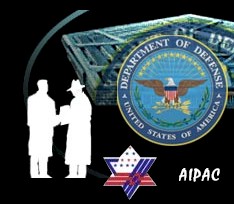 Presiding
Judge T.S. Ellis ruled against
most of the prosecution team's efforts to limit Rosen and Weissman's
broad subpoena list of high US government
officials in the prosecution of the former AIPAC officials. Presiding
Judge T.S. Ellis ruled against
most of the prosecution team's efforts to limit Rosen and Weissman's
broad subpoena list of high US government
officials in the prosecution of the former AIPAC officials.
The prosecuting attorneys wanted to block the 16 subpoena requests
including the testimony of Secretary of State Rice and
Stephen Hadley, President Bush's national security adviser, allowing
only four. Others that Rosen and Weissman may now
subpoena include Elliott Abrams, former Iran Contra conspirator
convicted on two counts of misleading Congress and Bush's top adviser on
Middle East policy, Richard Armitage, and Paul Wolfowitz.
While compelled testimony from the authors of the most disastrous
foreign policy in the nation's history may seem to be a welcome ray of
light, it is unlikely to ever happen. The defense may be counting on
this as a "graymail" strategy to get the case thrown out, thereby
avoiding the embarrassment of current and former officials. Judge Ellis
gave AIPAC reason hope it may work. It is likely that the subpoenaed
witness will not appear on grounds of "executive privilege". If Ellis
reads the news, he knows that this has already occurred when Bush
administration officials refused to appear before Congress to discuss
the firing of US attorneys. If this happens again, the case against
AIPAC will be over, as Judge T.S. Ellis plainly
stated:
"The government's refusal to comply with a subpoena in these
circumstances may result in dismissal or lesser sanctions."
There are multiple concurrent
behind-the-scenes efforts that would likely result in getting this case
thrown out. New
legislation purporting to strengthen "protection of reporters" and
the real possibility that government agencies
won't declassify enough of the wiretap and surveillance data documenting
Weissman and Rosen's alleged espionage activities are only two. The US
attorney who originally brought the charges against Rosen and Weissman
unwound the very guidelines that kept the prosecution moving, before
he was jettisoned in the ensuing Attorney firing scandal.
An examination of Attorney General nominee
Michael Mukasey's record also indicates additional allies of AIPAC may enter the fray to help drop the
case. While
hard on convicted terrorists, Mukasey's sentencing docket
reveals a
light touch for tie-bearing criminals. If confirmed, he would
be very likely to order US Attorneys to drop the case entirely.
In "Foreign Agents"
IRmep documents the
sordid history of AIPAC, an organization that since its founding has
routinely flouted important US laws including Foreign Agent
registration, the Logan Act, election laws, and
possibly the 1917 Espionage Act. It is now more likely that AIPAC
will not face any criminal consequences for employing espionage as a
tactic to influence US policy development on Iran. However, the
generally underreported details of the trial should not escape the
attention of citizens committed to cleaning up Washington. |
 |
10/11/2007
 |
|
Grant F. Smith:
These are
stifling times at college campuses |
|
More than a decade later, I stand in awe
over how intolerant of diverse views higher education and research
institutions have become. The educational ferment is being purposefully
watered down as cowardly administrators prioritize endowment over
education. John Mearsheimer, a
professor of political science in Chicago, is now something of a pariah
for his recent work on the Israel lobby, unwelcome and disinvited from
numerous relevant venues. I now agree with much of what he says, but
also value the opportunity to consider opposing views. |
|
Complete
OpEd (HTML) |
 |
 10/09/2007
Excerpt
from the book "Foreign Agents" 10/09/2007
Excerpt
from the book "Foreign Agents" |
|
Where did AIPAC Come From? |
...The break between Ben-Gurion and Eshkol
occurred over Ben-Gurion's insistence on fully investigating and
learning lessons from the sordid Lavon Affair. Eshkol was insistent that
investigating the affair was a waste of time, and wished to bury it as
soon as possible. On December 13, 1964, he addressed the issue to the
Mapai Central Committee.
"If I vote in favor of an inquiry
into the Lavon Affair�We would be opening a Pandora's box of
troubles. It will not end with this affair or with this
investigation. We'll be spending the next fifteen years dealing with
investigations into various unsolved matters."
Levi Eshkol, the Jewish Agency executive
overseeing funding for the establishment of the Israel lobby in the
United States, successfully quashed Ben-Gurion's demand to appoint a
judicial inquiry into Israel's false-flag attack on America when he
became prime minister of Israel. |
|
Full
Excerpt (HTML) |
 |
9/28/2007 Voice
of America - Inter American Forum |
|
US Financial War
against Iran joined by Rhetorical "Surge" |
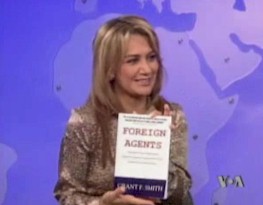 IRmep:
Iranian President
Ahmadinejad
can travel to Venezuela, he can travel to Bolivia to
talk about developing their natural gas. He can travel to
Nicaragua to gift new housing, tractors, etcetera. However, Iran,
in this moment, is under economic sanctions, led by the US Treasury
Department, whose members are traveling through every part of the world,
trying to intervene in any major foreign investment in Iran.
Treasury says to banks, for example, "if you are facilitating these
types of projects (like South America), you're going to lose access to
the US financial system", as well as possibly confidential and reliable
access to global financial facilities and consortiums in Europe (such as
SWIFT). Meanwhile, there is another intense behind-the-scenes
action outside of the United Nations, building at the state level in
California, Texas and fifteen other US states declaring that no state
pension funds can be invested in companies that have anything to do with
Iran. In California, that equals $350 billion dollars. So
the "rhetorical" war surge is layered on top of an existing and very
real financial war. While
Ahmadinejad
can travel through South
America after his UN activities garnering political support, his
promises are going to crash against the reality that Iran has diminished
access to the financial and corporate levers they need in order to honor
promises and announced aid packages in Latin America. IRmep:
Iranian President
Ahmadinejad
can travel to Venezuela, he can travel to Bolivia to
talk about developing their natural gas. He can travel to
Nicaragua to gift new housing, tractors, etcetera. However, Iran,
in this moment, is under economic sanctions, led by the US Treasury
Department, whose members are traveling through every part of the world,
trying to intervene in any major foreign investment in Iran.
Treasury says to banks, for example, "if you are facilitating these
types of projects (like South America), you're going to lose access to
the US financial system", as well as possibly confidential and reliable
access to global financial facilities and consortiums in Europe (such as
SWIFT). Meanwhile, there is another intense behind-the-scenes
action outside of the United Nations, building at the state level in
California, Texas and fifteen other US states declaring that no state
pension funds can be invested in companies that have anything to do with
Iran. In California, that equals $350 billion dollars. So
the "rhetorical" war surge is layered on top of an existing and very
real financial war. While
Ahmadinejad
can travel through South
America after his UN activities garnering political support, his
promises are going to crash against the reality that Iran has diminished
access to the financial and corporate levers they need in order to honor
promises and announced aid packages in Latin America. |
|
Windows Media Video (WMV) |
 |
|
9/16/2007
Radio France -
The
Petraeus Report - Analysis |
Politicized Troop
Movements?
 |
|
Radio France Internationale: The US President
George W. Bush Hill announced the withdrawal
of 30,000 US troops deployed in Iraq. This message is directed at two
audiences. In the US Congress the commander
of US troops in Iraq, general David
Petraeus,
warned legislators that a rushed withdrawal would have grave
consequences, and announced that "surged troops" could be withdrawn in
the summer of 2008. For his part, Bush said his Iraq policy is base
upon recommendations from his commanders in the field. However the
questions raised are whether the troop movements are political in nature
or part of a
military strategy. The answer of Grant Smith, Director of Research of
IRmep in Washington, DC.
Grant Smith, IRmep:
Many in America perceive the
Petraeus
report and forecast troop reduction as a purely political move. That's
because, number one, the net affect of withdrawing troops sent as part
of the so called "surge" basically leaves the
same number of troops that were there before the escalation. Number
two, now that the political season of US presidential campaigns is
arriving, if there is no positive news and moves with respect to Iraq,
it will have a negative effect on Republican candidates. But there is a
building domestic public opinion that these heavily publicized numerical
troop movements have been all but completely
politicized. |
|
Full
Broadcast (MP3) in Spanish |
 |
|
9/1/2007
New Book
FOREIGN AGENTS: |
|
The
American Israel Public Affairs Committee from the 1963 Fulbright
Hearings to the 2005 Espionage Scandal |
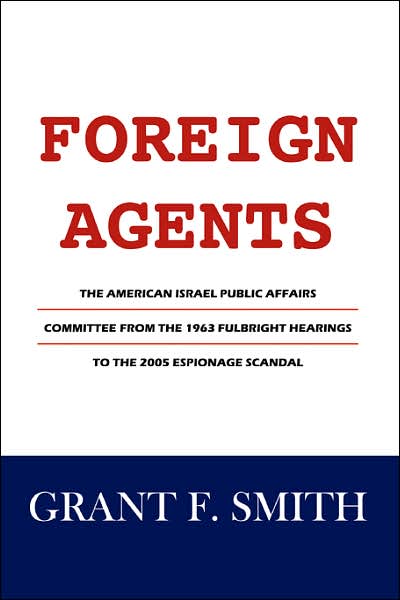 "In
this book, Grant Smith renders a vital public service by providing
chapter-and-verse evidence that the American Israel Public Affairs
Committee--Israel's U.S. lobby--is the agent of a foreign government and
has violated public law for years in ways that seriously harm U.S.
national interests."-Paul Findley, former US Congressman "In
this book, Grant Smith renders a vital public service by providing
chapter-and-verse evidence that the American Israel Public Affairs
Committee--Israel's U.S. lobby--is the agent of a foreign government and
has violated public law for years in ways that seriously harm U.S.
national interests."-Paul Findley, former US Congressman
"For those who want to understand how AIPAC and the Israel lobby have
hijacked the American political process, Grant Smith's Foreign Agents is
required reading.-Jeffrey Blankfort hosts the
international affairs program "Takes on the World" on KZYX Pacifica
Radio in Mendocino, California.
"Wealthy, powerful,
almost covert, with the proven capability of strongly influencing the
media as well as both parties in Congress and the White House, AIPAC's
omnipresent, little-known activities demand the public scrutiny that
Foreign Agents initiates." -Ambassador
Edward L. Peck is former Chief of Mission in Iraq
and Former Deputy Director, White House Cabinet Task Force on
Terrorism
"AIPAC has proved itself to be a danger to our
democracy by using money and political power to benefit a foreign
government, all at the expense of the American taxpayer. Grant Smith has
done a great deal of powerful research to bring facts that will benefit
us all when making decisions as to who we vote for." -Senator James
G. Abourezk
"Grant Smith has produced a momentous scholarly work that reveals an
eye-opening picture of the carefully guarded operations of the Israeli
lobby and its unparalleled influence over US policy in the Middle East.
What makes this daringly debunking research work convincing and its
arguments irrefutable is the fact that it steers past the dangers of the
conspiracy theories surrounding the Israeli lobby by drawing exclusively
on official government and/or public sources of information. Foreign
Agents is a must read primer for anyone interested in making sense of
our government's policy in the Middle East and its implications for our
domestic politics and priorities." -Ismael Hossein-Zadeh Ph.D. is
Professor of Economics at Drake University and Author of the book "The
Political Economy of US Militarism"
"In Foreign Agents, Grant Smith has drawn together the historical
threads of a foreign lobby group that has managed to slip between the
cracks despite its connection to numerous illegal activities in the
United States. Foreign Agents reveals what every American citizen should
know about AIPAC, the Israeli lobby which holds sway over many US
politicians, and hence US politics, often to the detriment of US
interests. A must read book."
-Kim Petersen is the co-editor of the Dissident
Voice newsletter
"Grant F. Smith's book
provides a superb review of the efforts that have been made to expose
the Israel lobby from 1963 to 2005. Smith's work is extremely well
researched. He gathers together documents, testimony from closed-door
hearings, and news articles that most
Americans have totally forgotten... His work is monumental."
-Richard Curtiss executive editor of the
Washington Report on Middle East Affairs |
|
Paperback $14.95 Hardcover $26.95
Purchase Online with Free US Shipping |
 |
 Pacifica Radio New York
Pacifica Radio New York
8/19/2007 Shelton Walden
Interviews Grant Smith about
Foreign Agents
(MP3)
(WMA) |
 |
8/17/2007 Voice
of America - Inter American Forum |
|
Iranian
Aid to Nicaragua - Inflating the Threat to the
US....Again? |
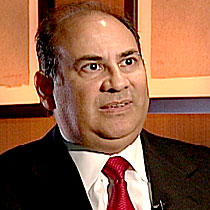 |
 |
| Roger Noriega (American
Enterprise Institute) and former undersecretary of State:
"You really have to
go out of your way to reach out to one of the four biggest rogue
states in the world, Iran, which is recognized as a pariah by
all the respectable countries of the world.
So unfortunately, President Ortega seems to be going back
to the past." |
Grant Smith (IRmep):
"Let's just look at who is saying that. Noriega
(Roger) was up to his elbows in the US Contra war against
Nicaragua in the 1980's. He's got his agenda, but I don't think
his agenda is either open or very rationally thought
out....Ronald Reagan after all told us that Nicaragua had the
capability to invade Texas...." |
Adriana Amat: And so you
say Iran is obviously a terrorist state?
Grant Smith: No, I didn't say that Iran is a terrorist state, the
Bush Administration is naming them, indirectly.
Adriana Amat: Fine, the Bush administration and ambassador Paul
Trivolli. But
where I'm going with this is the following,
Grant. Iran is a threat for the United States, but the fact that they
are allying with persons such as Daniel Ortega, or Hugo Chavez, really
should be worrisome?
Grant Smith: No. Before anything, I am not in agreement that Iran is
some big threat to the United States.
Adriana Amat: But you agree that it is a dangerous partner for
country like Nicaragua?
Grant Smith: Sure, it is an ally
that the Bush administration considers dangerous. But let's look at who
says they are such a dangerous ally. Let's look at who is saying that.
Noriega (Roger) was up to his elbows in the US Contra war against
Nicaragua in the 1980's. He's got his agenda, but I don't think his
agenda is either open or very rationally thought out. The US can have a
great deal of problems with Iran, in the Gulf, if there is an armed
conflict, because the Iranians have the capability of shutting down
petroleum flow through the Gulf. The US is preoccupied by the nuclear
program. But Iran the great threat? Right now? Against the United
States? And our domestic interests? I think it's a little inflated
sometimes the rhetorical warfare that's coming out of Washington.
Adriana Amat: Excellent, for clarifying
that point. |
|
Video Interview
Transcript (HTML) |
 |
|
8/16/2007
Inside Higher Education |
International Arab Students not receiving full benefits of a US
Education |
|
But by and large, the recent history of
Saudi-U.S. interaction on U.S. campuses is characterized by
"broad
failures," says Grant Smith, director of research for the Institute for
Research: Middle Eastern Policy, a Washington think tank supportive of
increased relations with the Arab world that conducted an online survey
this spring of Saudi students in the United States. The results
suggested that Saudi students are spending more time with other Saudis
than they are with either American students or foreign students from
other countries, and many feel they're receiving only
"average
treatment" from tutors and teaching assistants.
"Some of the reasons that you'd think we'd
want these students here in terms of integration, getting to know us,
our way of life � they're not happening," says Smith. |
|
Inside Higher Education
article (HTML)
Full Student Survey Results (PDF) |
 |
|
8/1/2007
Kaleej Times -
US Arab
Trade Outlook |
US exports to Arab world set to hit $45 billion in 2007
 |
Sales of American merchandise to the Arab
world in 2006 topped $35 billion, a 28 per cent increase over the
previous year. The outlook for 2007 is even more promising, with
estimated US sales surging to $45 billion, according to the
Institute for Research: Middle Eastern Policy.
US-Arab bilateral trade reached $109 billion in 2006, an increase of 25
per cent over 2005 levels. Total Arab market imports are expected to
reach $405 billion, an 11 per cent increase over year 2006.
According to the report, the single most important factor in the rise of
US exports in 2006 was the depreciating dollar, which made US goods very
competitive against comparable products from Europe, Asia, and
elsewhere. In 2006, the value of the dollar fell about 10 per cent
against the euro, and a further decline is taking place in 2007. The
continuing weakness of the dollar will cause US global exports to grow
by double digits throughout 2007, according to the Economist
Intelligence Unit. |
|
Kaleej Times report (HTML)
Full Trade Report (HTML) |
 |
|
7/16/2007
Radio France -
US Led
Regional Peace Conference - Full Interview |
A Good Faith Peace Effort?
 |
Radio France Internationale:
The American proposal to have a regional peace conference in the
coming months has been immediately rejected by the radical Palestinian
movement Hamas....
The reactions of Grant Smith, director of the Institute for Research:
Middle Eastern Policy.
Grant Smith: It is a step
in which president Bush
is moving somewhat
toward reinitiating the peace process. Until
now, this administration has made no credible effort to make parties
adhere to the "roadmap for peace" and this is an opportunity to do that.
Systemically, all American lame duck
presidents have a moment in which they can safely ignore the Israel
lobby and attempt to do the right thing in the region. Clinton took
advantage of this moment, and Bush could as well.
It remains to be seen, however, whether Bush is only using
this so-called initiative as yet another
club against Hamas.
Unfortunately, with the conditions between Fatah and Hamas, and the Bush
strategy of only supporting Fatah and shutting out Hamas,
make it difficult because this strategy
does not address the true power centers, and
will not be recognized as a legitimate effort to reconcile the two
factions.
In 1948 when Israel was formed, its most active terrorist groups such
as Lehi and Stern were folded into the new Israeli
government, with little opposition by world powers.
It was controversial and difficult,
particularly for the British, to simply "move on" and forget about the
rampant assassinations, bombings and terror campaigns. Bush
could "move on" as well. He
could recognize and address the
legitimate and real grievances that fuels Hamas. Bush could
begin to act on
behalf of the American people, rather than the narrow domestic interest
groups and Israel lobbyists he is typically surrounded by. Now is
the moment for a major, if only temporarily sustainable, improvement in
US policy formulation. |
|
Full
Broadcast (MP3) in Spanish |
 |
|
6/17/2007
Radio France - Outside Military Support for
Palestinian Factionalism
- Full Interview |
Installing Fatah in exchange for
Withheld Tax and Customs Revenue |
RFI: The
Palestinian president, Mahmoud
Abbas, signed a decree in the early hours this Sunday a decree creating
a new emergency Palestinian government.
The new cabinet which will assume power
within hours is composed of ten ministers,
none of which are members of the Islamist
group Hamas, rival of president
Abbas. Nevertheless,
we are informed that neither will they be officially recognized as
Fatah party members of the president.
The Israeli prime minister, Ehud Olmert said
that his government would recognize a Palestinian government that did
not include ministers from Hamas. Olmert
told journalists that the new government would represent a new
opportunity for peace, and that he is willing to work with it.
The statement from Olmert
came after signs of western support for Abbas,
who has been confronting Hamas
in violent conflicts within the
Palestinian territories. Washington announced
on Saturday that it would lift a financial
embargo over Palestinian territories
established 15 months ago after the electoral triumph of
Hamas, after the new government is in place.
The "quartet" member countries, composed of the US, EU,
UN, and Russia showed signs of support for the
decision of Abbas to dissolve the
Palestinian government and declare a state of
emergency. Europe could adopt the same
position as Washington, and reestablish support for the
Palestinian government, allowing funding to
enter Gaza where Hamas won military engagements during this week.
According to research director of the IRmep, this is the result of
outside military support for the Fatah party
under Abbas:
Grant Smith: Before, Israel and
the US unilaterally decided that they could no longer live with
Fatah and its leader (Yassir Arafat). Now,
they've decided that Fatah is the salvation of Israel. We can see that
after a low intensity conflict, with the Bush administration helping
Fatah elements with arms and money, they've been able to
achieve a rather minor objective, something that would have been
easily accomplished in 2005, that is actually supporting Fatah.
What would have been even better would be finding a way at that time to live with
Hamas within a productive role in the
coalition government. We need to remember that the Palestinian
government was formed as a result of elections the entire world
perceived as legitimate, and representative of Palestinian aspirations.
Now, Israel and the Bush administration have decided that they only want
to work with one faction, whether the resulting government is considered
to be legally constituted and legitimate or not, and they've chosen
Fatah as the new strategy within the Israeli occupied territories.
The aid issue might seem like great
news to some, and it certainly is circulating in the mainstream news
outlets from Washington to Tel Aviv. But the
fact of the matter is that the initial money being released are tax and customs fees that belong to the
Palestinian people, more than $600 million,
which the Palestinians desperately needed for
social and other purposes, but were being deprived of by Israel in
partnership and with full support of the Bush administration. |
|
Full
Broadcast (MP3) in Spanish |
 |
|
5/3/2007
IRmep Center for Policy
and Law Enforcement |
|
IRmep - An Ex Parte
Intervention in the AIPAC Spy Trial |
On
April 23, 2007, IRmep filed a formal submission urging that
evidence presented by the US Attorney's Office in the
AIPAC espionage case not be undermined or dismissed on public
disclosure technicalities or behind-the-scenes pressure
applied by big media companies.
IRmep also sent a copy of the article titled "Is
the Media Sabotaging the AIPAC Spy Trial"
to Judge T.S. Ellis III and the prosecution
team, Kevin DiGregory and William N. Hammerstrom.
On March 13, 2007 major corporate media
companies filed an "emergency
motion for leave to intervene" in the trial. The
corporate media giants demanded that the
prosecution not be allowed to use any wire
intercepts and other classified material in
their prosecution under coded reference, unless it was declassified
and made available to all members of the public, including the
press. The prosecution wanted to established CIPA procedures to avoid
disclosing sources and methods the US utilizes to protect America
against Israeli espionage. These CIPA procedures would have
allowed defendants and the defense team
access to all classified information.
It is IRmep's conclusion that the corporate media outlets involved in
the motion are not intervening in good faith. Several have been the
recipients of classified information allegedly purloined by AIPAC,
including the Washington Post and Reuters. Their filing confirms their
belief that newspapers must be free to publish stolen classified
information selectively released by a foreign lobby. But
their belief is highly suspect. A review of recent past cases
involving demands to disclose classified information as well as sources
and methods in espionage trials reveals that the press normally
*universally condemns* this defense tactic as a type of "blackmail"
(more precisely referred to as "graymail".)
IRmep's filing simply states the obvious: Allowing
a foreign lobby like AIPAC to systematically scour the US government for
classified information, then divulging or trafficking
it to further the interests of Israel is not in America's best
interest. The corporate media has shown time after time its willingness
to be manipulated by selectively released classified information, pushed
by both lobbies and government actors. Mainstream media's highly
compromised press coverage of the buildup to
the Iraq invasion is only the most recent
tragic case in point.
In a positive development,
Judge Ellis
ordered that copies of the April 23, 2007
IRmep filing and copies of "Is the Media Sabotaging
the AIPAC Spy Trial" be delivered
by the clerk to all "counsel of record." However, he also
indicated that in the weeks before the trial begins (June 4, 2007),
subsequent ex parte submissions from IRmep will not be accepted by the
court. |
 |
|
|
|
4/20/2007
Radio France - Chaos in Iraq: |
4/21/2007
Graymail and Freedom of the Press |
The Product of Flawed Strategies |
Is Mainstream Corporate Media subverting the AIPAC Spy Trial? |
RFI:
US defense secretary Robert Gates has traveled to Falluja even
as criticism of the US troop escalation continue in Washington.
Grant Smith, director of the Institute for Research: Middle
Eastern Policy affirms the surge plan
is a disaster.
Grant Smith: With the latest massive
bombing attacking
against Shiites, we can see that the
escalation and presence of the United States, even with
additional troops, have not been able to achieve the Bush
administration's latest stated objectives: creating security and
a new atmosphere of hope.
Meanwhile, we have a debate in Congress in which Democrats are
insisting on milestones and measurable
progress instead of providing funding entirely free of
restrictions.
We see the two as running in parallel: a battle here in
Congress over funding, and there against an escalation which is
revealing that both the number of
troops and strategy are not going to stem the violence.
|
Another
AIPAC motion to intervene filer, the Reporters Committee for
Freedom of the Press, clarified the mainstream corporate
media's collective desire to continue serving as a
willing conduit for selectively released classified information,
According to Lucy Dalglish,
executive director of the Reporters Committee for Freedom of the Press,
"Journalists who cover national security and defense receive
classified information all the time, It's
virtually routine. If that were the standard for bringing an espionage case,
we'd be locking up a lot of people in this town and there would be fewer
sources of information."
Notwithstanding the press's
apparent willingness to be used to further AIPAC or any
other lobbies' policy
objectives by selective disclosure of classified information,
secrecy in trials raises questions. Does the
elite media's own reporting record
reveal a consistent industrywide commitment
calling for
disclosure of secret evidence in all high profile criminal trials?
It does not.
|
| Full
Broadcast (MP3) in Spanish |
Full
Essay (HTM) |
 |
 |
|
4/14/2007 |
4/16/2007
|
|
IMF and World
Bank Struggle to be Relevant |
Ousting
Wolfowitz: |
AL-EQTISADIAH NEWSPAPER |
Never Qualified
to Lead the World Bank |
The International Monetary Fund
is struggling to both influence trade,
monetary and fiscal policy in an age where it is becoming
increasingly less relevant.
In Latin America, borrower states such as Argentina have already
refinanced IMF loans with cash rich
Venezuela, while proclaiming IMF austerity programs
are of little value in restarting the economy. In the
Arab world, regionally generated foreign
direct investment led by UAE and Saudi Arabia similarly
overshadows the funding and terms
available from the IMF.
Nevertheless, an explosive future currency realignment is on the
horizon, If the Chinese Yuan and Saudi
Riyal were free floating today, their value would be
different. If China were not pegging the Yuan to the US
dollar, the price of Chinese goods
which are omnipresent in US consumer markets, would already have
increased substantially over past years. The case for
freeing the Yuan to allow it to rise
against the dollar on the basis of basic economics of free trade
is clear.
Asking for adjustments to the Saudi Riyal is not
a clear cut case. The US benefits greatly from a world
petroleum market based largely on the
US dollar. The price of the dollar is propped
up as buyer and supplier countries maintain adequate
reserves of the currency for energy
market transactions. If pressure from the US led
to major exporters pricing and asking for major contract
transactions in Euros or another
currency, the US dollar would suffer. |
 Paul
Wolfowitz
has been blight upon the World Bank
and a matter of shame for many Americans who are still
seeking clarification over his role in
developing and promoting fatally flawed US policies in the Middle
East. Paul
Wolfowitz
has been blight upon the World Bank
and a matter of shame for many Americans who are still
seeking clarification over his role in
developing and promoting fatally flawed US policies in the Middle
East.
Wolfowitz has a long history of fraud against the United States.
In the 1980's, he played a central role in inflating estimates of Soviet
military threats in a successful bid to unnecessarily increase
defense spending against what were later
revealed to be non-threats such as
stealth submarines and the Backfire bomber.
In 2002, Wolfowitz played a part in the Boeing air tanker
scandal, in which US tax payers, on his recommendation, were to
pay leasing margins for a new fleet of refueling tankers, rather
than issue US government bonds for financing.
This blunder alone would have disqualified him from any serious position
involving finance requiring integrity, knowledge of debt
financing and transparency. In Iraq
his strategy, again fueled by
disinformation, has played a critical part in the death of more
than 600,000 Iraqi civilians and creation of
two million refugees.
Wolfowitz has never been qualified to lead
the World bank.
Even cursory analysis of his skills, moral standing,
and accomplishments make his
immediate ouster an urgent, though second best solution to never appointing him in
the first place. |
|
|
Full IMF Analysis (PDF)
in Arabic |
|
|
 |
 4/11/2007
US Taxpayer Dollars and
National Identity Going
Down the Drain: 4/11/2007
US Taxpayer Dollars and
National Identity Going
Down the Drain: |
|
Cutting Off Funds for Flawed
Neocon Fantasies |
 IRmep
believes Congress needs to come together and staunch the steady bleeding
of American taxpayers, which is now entering
its fifth year. While we've
opposed the US invasion since before it began, there are five
reasons why even supporters of a so-called "Global War on Terror" now
need to pull the plug before the Iraq debacle brings America to its
knees. IRmep
believes Congress needs to come together and staunch the steady bleeding
of American taxpayers, which is now entering
its fifth year. While we've
opposed the US invasion since before it began, there are five
reasons why even supporters of a so-called "Global War on Terror" now
need to pull the plug before the Iraq debacle brings America to its
knees.Reason #1:
A "Credit Card" War Drags on Future Generations.
The United States is financing the Iraq occupation with
deficit spending. In 2003
Americans rightly rejected the
neoconservative plan for the Department of Defense to "lease" air
tankers for Middle Eastern air wars. That case rightly put
Pentagon and industry officials (though not the
authors of the plan)
behind bars. Americans saw the deal for what it truly was:
corruption. Americans are now rejecting the idea that the cost of the
misguided Iraq war is being passed on to our future generations who will be
repaying creditor nations such as China that purchase US government bonds
financing this disastrous war. Like the tanker deal, Americans usually reject the idea of paying
interest above and beyond the base cost national security interests. The Iraq war was deficit financed because it never was vital to the
US's true defense needs. The shell game of hiding the cost
of the war to make it palatable to American taxpayers is no longer feasible
as interest rates climb and the value of the dollar plunges. The
"credit card financed war" game is up. |
|
Full Essay |
 |
4/6/2007
Douglas Feith's OSP and
Intelligence Falsification: Radio France Internationale
 |
|
Pre-Invasion Neocon
Propaganda |
Intro: The Pentagon has confirmed in
a report that Saddam Hussein did not have links with
Al Qaeda,
one of the principal arguments of President George Bush for invading
Iraq in 2003.
There were no links between ex-Iraqi president
Saddam Hussein and the
Al Qaeda terror network according to a
Pentagon inspector general report released
this Friday. The alleged links between Hussein and
Al Qaeda were one of
the key arguments to justify President
Bush's invasion of Iraq in 2003.
The war was launched on the basis of manipulated information according
to the Institute for Research: Middle Eastern Policy
in Washington, whose director Grant Smith speaks to reporter Luis
Eduardo Arizalde:
Grant Smith: "It is perfectly clear that the groups pushing the
Iraq-Al Qaeda case, presented false information through different news
media, and most importantly spokespersons such as Richard Perle,
appeared constantly in all of the US news programs in 2001 and 2002
presenting the case for war, They had a lot of success propagating false
information, and until now, none of these people have paid any price, in
terms of criminal prosecutions. There are laws on the books in this
country (the USA) against
wire fraud, or rather, the dissemination of false information, but
nobody has yet paid any price for this massive
disinformation campaign." |
|
Audio Only (MP3)
in Spanish |
 |
 3/30/2007
Kiplinger Magazine Profiles IRmep Arab Trade Report 3/30/2007
Kiplinger Magazine Profiles IRmep Arab Trade Report |
|
Problems in Iraq aren't hurting U.S. exports to the Arab world. In fact,
they're booming this year and are on course to far outdo last
year's total of around $35 billion. The National US-Arab Chamber of
Commerce, which closely tracks these trade flows, sees the export total
reaching $45 billion this year. (IRmep
Forecast) |
|
Kiplinger report (HTML)
Full Trade Report (PDF) |
 |
 3/15/2007
Washington Post profiles IRmep Report 3/15/2007
Washington Post profiles IRmep Report |
|
US Exports to Arab World Surging, Report Says |
WASHINGTON (Reuters) - U.S. exports to Arab nations are forecast to
reach a record $45 billion in 2007, shattering the previous high set
last year, according to a report released on Thursday.
High oil prices boosted the Arab world's buying power at the same time a
declining U.S. dollar made American goods more competitive, according to
the report, which was prepared by the Institute for Research: Middle
Eastern Policy.
Those factors helped U.S. exports to the Arab world grow rapidly,
despite widespread criticism of U.S. policies in Iraq and frequent calls
to boycott American products.
Despite the forecast for U.S. exports to the region to expand nearly 30
percent this year, the Iraq war is just one of many "storm clouds" on
the horizon, the report said. |
|
Washington Post report (HTML)
Full Trade Report (PDF) |
 |
 02/23/2007
Television Interview - "Viewpoint" 02/23/2007
Television Interview - "Viewpoint" |
|
An
Iraq War Subsidy financed by Deficit Spending |
| IRmep:
Larger companies, to some extent, and this is a really crass thing to
say, but the calculation may be, "I can export microprocessors in
PCs (personal computers) or smart bombs. I can sell foodstuffs
(processed) through supermarket chains or the KBR 'chuck wagon' on the
military base." There is a subsidy that is going on right
now that has cushioned much of the Fortune 500, which is this deficit
financed war, which has made them not feel this as much as smaller
companies. 97% of exporters have less than 500 people
(employees) in terms of company size. They are definitely
feeling it. But there is a feeling, that up until now, there has
been a "cushion" in the larger companies because all of this
(US exports to the Arab market) is "dual use"
technology. Vehicles...food...etc.
ViewPoint: Is it possible
we're not going to hear much more about this until those companies
start to say something about it?
IRmep: Well some of those
companies are beginning to talk in generalities. They don't want
to go to this level (Visa Denied Report), a lot of them, because it
really doesn't look good. To tell the truth, there aren't a lot
of executives who want to go on record saying, "we could have
done a lot better in terms of our sales to the Middle
East". |
| Full
Discussion
(Windows Video
400 kbps) Audio Only (MP3) |
 |
2/23/2007 VOA Panel Discussion |
| Is
the US Considered an "Honest Broker" in the Middle East? |
Adriana
Amat: What possibilities for peace in the Middle East do you see, between Israelis and Palestinians, and returning to psychological warfare, children in school are taught from a very young age to hate "the enemy". The enemy is Israel, or the Palestinian. In an opinion survey, there are people who don't want to appear on camera, who have a strong opinion about this on the Palestinian side. One asks them
"what do you want to happen" and they take out a map of Jerusalem and say, "this is my land. And I am going to teach my children to fight for this land." You go and ask an Israeli the same question, and get the same answer.
Grant Smith: Well, for many centuries, Jerusalem was a city shared by three faiths. It is not impossible that it will return to that status. We are always directed to focus on "Palestinian terrorism" forgetting that in 1948, the terrorists were the Israelis.
Yitzhak Shamir was considered by Britain to be terrorist #1 of the Middle East. Israeli terrorist groups such as Irgun and Stern were integrated into the Israeli military.
There was more consciousness and tolerance for the transformation of the "terrorist fighting for his land" toward a state. However, the world, particularly the US no longer has this same type of patience for the Palestinians, who are the true victims in this case. |
| Full VOA Discussion
(Windows Video
400 kbps) Transcript (English HTM) |
 |
|
2/20/2007 |
|
Report Analysis and
Discussion |
AL-EQTISADIAH NEWSPAPER |
The United States continues to tie Free
Trade Agreement (FTA) negotiations to political
rather than economic objectives. The US has shunned
negotiations with existing customs unions
such as the GCC in spite of Congressional Research Service studies
revealing that negotiation time and
resources would be better invested in negotiations with larger
entities.
Although US exports to the GCC became more attractive in 2006 as the
dollar fell 11% in value against the Euro,
general US import tariffs on aluminum
articles still range from 2.5% to 6.5%. The Bush
administration's trade promotion authority, the ability to
negotiate on an accelerated basis with an
up or down vote by Congress, expires on
July, 1 2007.
Business leaders in the US are urging the administration to realign
trade promotion
to opportunities, job creation and efficient supply chain
management. As the GCC continues to
transform from resource exportation to high value added production,
it remains to be seen whether US trade
policy will be able to align itself to new opportunities.
|
|
English Machine Translation (HTML)
Arabic (HTML)
Arabic (PDF) |
 |
|
2/9/2007 |
|
Report Analysis and
Discussion |
AL-JAZEERA
TELEVISION |
Al
Jazeera: What are the direct and indirect economic impact of US visa
obstacles in the Arab world?
IRmep: In this first detailed study we have
estimated approximately $101 billion dollars in losses to
manufacturing industries in the US. Losses for travel and tourism
are approximately $1.8 billion. Higher education, which is not
usually considered a service export, has had losses of around $2
billion which is equivalent to 9,000 jobs. This is problematic
because the Arab market is extremely attractive to the United
States. It has grown in terms of import demand from approximately
$170 billion at the beginning of this century, or rather, the year
2000, to over $345 billion dollars estimated for this year. So as
the US "locks out" industrial and commercial buyers, along with the
students and tourists, the losses are mounting." |
| Video
Clip (WMV) English Transcript (HTML) |
 |
|
2/2/2007 |
|
Report Analysis and
Discussion |
AL-EQTISADIAH NEWSPAPER |
|
US Visa Policy Diminishing Exports and Manufacturing Jobs |
| The
arrival of Arab visitors to the US peaked
in 2001 at 315,000
thousand entries. By 2005 the number had
declined to less than 200,000. According to the report
VISA Denied, this barrier was a causal factor
in the decline of the real value of exports from America to Saudi
Arabia. These exports reached only $6.8
billion dollars in 2005. Absent growing barriers, exports could
easily have reached $18 billion tracking pre 9/11 share growth trends.
|
|
English Machine Translation (HTML)
Arabic (HTML)
Arabic (PDF) |
 |
|
1/25/2007 |
1/25/2007 |
| IRmep
Publishing Report Release |
Radio Interview
 Los Angeles
Los Angeles |
|
Visa Denied: How
Anti-Arab Visa Policies Destroy US Exports, Jobs and Higher
Education |
The
Opportunity Cost of US Visa Denial |
In the aftermath of 9/11 US visa
processing in the Arab world has ground to a halt.
US
consulates
formerly striving to outsource key visa processes to travel agencies before
the terror attacks are now paralyzed and fearful. Under funded and
insufficient security review processes leave Arab executives, prospective
students, and vacation travelers in limbo for years or looking for
alternative destinations. Shabby treatment of those who successfully
run the visa gauntlet leaves many vowing never to return to the US.
How much has it cost? The damage assessment is
now in:
- Total US manufacturing
jobs sustained by Arab market demand reached 215,000 in
the year 2005, but could have been 420,000 with more
effective and non-discriminatory US visa policies.
- Arab business and tourist
travelers remained at half their 2001 levels, creating five
year travel related service losses of $1.775 billion and
4,126 potential service jobs.
- In 2005 Arab student
enrollment in the US higher education system reached only
66% of the 2001 level. The US higher education system lost
$1.989 billion in revenue and 9,000 education and support
service jobs.
Visa Denied quantifies
the damage done to US exporters, travel related service industries
and the higher education system. Visa
Denied recommends steps to correct and realign a severely
degraded system to the true opportunity cost of flawed and sometimes
discriminatory policies. Visa Denied
traces a path from freewheeling days of
outsourced national security of the State Department
"Visa Express" system exploited by
9/11 hijackers toward the secure, efficient, and color blind visa
policy American stakeholders expect and deserve.
|
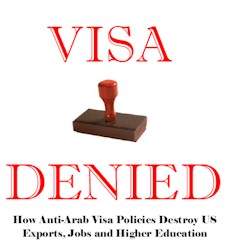 KPFK:
Analysts at the Institute for Research: Middle Eastern
Policy released a report today stating the US economy has
lost as much as $101 billion by excessively denying visas to
Arab business and tourist travelers since 9/11. Grant Smith
is the director of research at the institute. He says there
is a direct correlation between the percentage of visas
approved and a downturn in relationships between US and Arab
countries. As a result, the US is losing significant trading
opportunities with Arab nations which are increasingly
choosing to do business with more welcoming markets, such as
those found in Asia. KPFK:
Analysts at the Institute for Research: Middle Eastern
Policy released a report today stating the US economy has
lost as much as $101 billion by excessively denying visas to
Arab business and tourist travelers since 9/11. Grant Smith
is the director of research at the institute. He says there
is a direct correlation between the percentage of visas
approved and a downturn in relationships between US and Arab
countries. As a result, the US is losing significant trading
opportunities with Arab nations which are increasingly
choosing to do business with more welcoming markets, such as
those found in Asia.
IRmep: In this case, by having a "broad brush"
approach, in which the executive who goes to visit Detroit
to handle distribution of, say, the Ford Taurus, is being
denied visas year after year after year, because he is being
painted with the same broad (security)
brush as tourists who have never come to the United States,
that's too broad an approach. What we're arguing in the
report "Visa Denied" is that the opportunity cost is much
greater than the cost of simply having more sophisticated
filters and security. In particular, we need more qualified
personnel working in counselor offices. Right now the ratio
is something like 1 person for every 4,000 applicants. Our
argument is that the billions of dollars of trade potential
that we lose for under manning and understaffing that key
operation, is costing us dearly. |
|
In Stock -
Ships immediately
|
Audio Download (MP3) |
|
Download
Five Free Chapters |
Audio Download (WMA) |
|
 |
1/11/2007 Escalation: Radio France Internationale
 |
12/29/2006 Iraq:
The New Nakba? VOA |
|
Ana Maria Corneja: President George Bush announced tonight that
he would send 21,000 additional troops to Iraq, an unpopular measure
opposed not only by Congress now controlled by Democrats, but also
public opinion. The new strategy by the commander in chief
contemplates 4,000 US marines in Anbar province, and 16,500
soldiers in Baghdad. The additional soldiers will bring the total
force to 132,000 deployed in Iraq, where more than 3,000 have died since
the invasion in March of 2003.
President Bush as rejected the recommendations of the independent Iraq
study group led by ex-secretary of State James Baker and released a
month ago, for a change in strategy in Iraq in order to withdraw troops
by 2008. Senator Ted Kennedy has introduced legislation to require
congressional approval of any troop increase. Reactions of Grant
Smith, director of IRmep in Washington, DC. interviewed by Natalia
Olivares.
Grant Smith, IRmep: We are
going to see public protests, and the new Congress is going to feel it.
Obviously Senator Kennedy and others have already begun a discussion
about how to restrict funding an escalation in order
to have a real debate about the plan instead of simply approving it, as
they have previously in Congress. This is not the first time a
troop increase has been attempted to achieve the objective of control
over the capital city. The strategic analysis of previous military
generals who stated that at least 300,000 troops would be necessary by
historical experience as a minimum number to "pacify" or control a
country the size of Iraq were obviously more realistic. There are
many doubts about this new plan. |
Adriana Amat,
VOA: Latin America is not really a priority for the United
States, evidence of this includes the major foreign policy
speech Bush Hill deliver in January will
be about Iraq. What do you think of that?
Grant Smith,
IRmep: I think we've got some clues from events occurring
at the end of the year about where the Bush administration is
headed. UN resolution 8928 from the Security Council may form
part of a larger strategy to broaden the Iraq conflict to other
parts of the region. The economic and other sanctions against
Iran and inspections on the part of the IAEA in sixty days could
be a tripwire component to do engage as the Baker Commission
contemplated without seeing the real objective: expand
confrontation in the region. Not through consulting Iran, but
rather confronting Iran. Military observers have seen the
dispatch of another aircraft carrier to the region to make its
presence felt in the Persian (Arab) Gulf. It is perfectly
plausible, to those of us who studied the pretexts and steps
leading to the US invasion of Iraq that there will now be
sanctions, UN declarations that Iran is in violation of 8928,
giving the Bush administration even more justification to
increase troops levels in Iraq for "force protection" and
then completely change the dynamic
with Syria and Iran in a way not foreseen by the Baker
commission.
Adriana Amat,
VOA: How important is it that the number of US soldiers
killed in Iraq has now passed 3,000?
Grant Smith,
IRmep: The crisis of losing 3,000 is relevant, and we must
also compare it to the new Iraqi
refugee crisis. In the turmoil of 1948 when Israel expulsed
Palestinians from their homes and land, *only* 711,000 were
directly affected (UN number). Right now there are almost
800,000 Iraqi refugees in Jordan, and another 800,000 in Syria.
The US has caused the second "Nakba" in the region, the second
"tragedy". I like visions of peace, but the Bush administration
is not in the region to create peace. The administration's
"great thinkers" such as Michael Ledeen call
for regional chaos in order to completely restructure it.
|
|
Audio Clip (WMA) (MP3) |
Full VOA Discussion
(Spanish
Real Video 256kbps)
Partial Transcript (English HTM) |
|
 |
|
Continue (Year 2006 Research and
Events) |
|
|

 Sign
up for IRmep's periodic email bulletins!
Sign
up for IRmep's periodic email bulletins! Sign
up for IRmep's periodic email bulletins!
Sign
up for IRmep's periodic email bulletins!